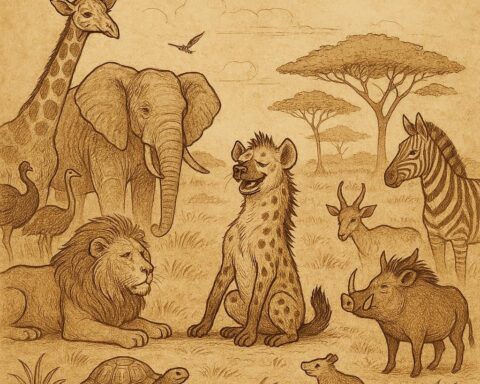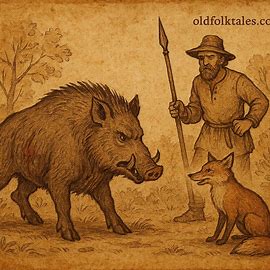One day, the hare, known for his wit and mischief, presented himself before God with a bold request. He bowed low and pleaded, “Lord, grant me greater intelligence, so that I may outsmart every creature that walks this earth.” God, who knew the hare’s cunning ways, looked upon him with both patience and caution. Instead of granting the request immediately, He decided to test the hare’s resourcefulness.
“Very well,” God said, “but first you must prove your worth. Go and fill this goatskin with living birds and return to me.”
The hare accepted the challenge eagerly, believing it an easy task. With determination, he carried the goatskin bag to the foot of a tall tree where many birds were perched. He sat beneath the branches and began to cry loudly, making pitiful sobs that drew the attention of the curious flock.
“What troubles you, Hare?” the birds asked, fluttering around him.
He wiped his tears and replied sorrowfully, “I made a wager. I claimed that you were not numerous enough to fill this skin. My rivals say I am wrong. If you would only help me prove them mistaken, I could win the bet.”
The birds, proud of their numbers, eagerly agreed. “Of course we are many enough!” they chirped. One by one, they hopped into the goatskin until all had entered. Without delay, the hare swiftly closed the opening, trapping them inside. With a sly smile, he carried the bag back to God.
READ: The Cunning Hare and the Sparrows| A Gambian Folktale of Wit and Restraint
God received it but was not satisfied yet. “You have done well, Hare,” He said, “but I have another task for you. This time, fill the goatskin with vultures.”
The hare, undaunted, repeated the same trick. He went to where vultures circled and perched. Sitting nearby, he began his performance again, arguing aloud as if quarrelling with unseen voices: “Impossible! Utterly impossible! How could they all fit?”
The vultures, intrigued, asked, “What is impossible, Hare?”
He replied, “I am told this goatskin could not hold all of you. But surely you are strong and many enough to prove them wrong.”
Stirred by pride, the vultures agreed. “We shall fit easily!” they declared. One after another, they climbed in until the skin was full. Once again, Hare sealed the bag and triumphantly delivered it to God.
God nodded slowly, watching the hare’s sly grin. “You are clever indeed,” He said, “but there remains one final trial. Bring me the brain of an elephant.”
The hare, though startled, did not despair. Instead, he devised another plan. He gathered a bundle of hay and went to sit by a well-trodden path, waiting patiently. Soon, a mighty elephant approached, its great form swaying gently as it walked.
“Hail, Elephant,” Hare called out respectfully. “Would you kindly help me carry this hay? It is too heavy for me alone.”
The elephant, generous by nature, agreed. He allowed the hare to place the hay upon his broad back. But the hare, cunning as ever, had tied the hay carefully, preparing it for his cruel trick. After climbing onto the elephant’s back, he secretly set the hay ablaze.
Within moments, flames engulfed the dry straw, burning fiercely. The elephant trumpeted in agony, thrashing about, but the hare leapt down to safety. Overcome by the fire, the great beast soon collapsed lifeless upon the ground.
Just then, a Laobe, one of the blacksmiths of the land, passed by with his sharp axe. The hare ran to him, crying, “Kind friend, please split open this elephant’s skull for me. I need what lies within.” The Laobe, without questioning, swung his axe and opened the head. From within, the hare took the elephant’s brain and hurried to present it before God.
God looked upon the hare sternly. “Oh, Hare,” He said with disappointment, “you are already too cunning for your own good. If I were to grant you more intelligence, you would harm not only the animals but even mankind itself. I cannot allow such mischief to grow.”
With these words, God struck the hare lightly on the forehead with His fist. The blow left a permanent white spot, marking him forever as a warning of his arrogance and reckless ambition.
That is why, even to this day, the hare carries a white mark upon his forehead, an eternal reminder of the time he sought wisdom beyond measure and was denied.
Moral Lesson
This Gambian folktale teaches that wisdom, when combined with arrogance and selfishness, becomes dangerous rather than beneficial. The hare’s cleverness brought him success, but his deceit and cruelty revealed his unworthy intentions. God’s refusal to grant him greater intelligence shows that true wisdom is guided by responsibility, compassion, and humility.
In life, intelligence should not be pursued for selfish gain or used to harm others. Instead, it must serve to build, protect, and uplift. The hare’s permanent mark is a lesson to all: unchecked cunning can destroy, while wisdom tempered with humility can bless.
Knowledge Check
1. Who is the main character of this Gambian folktale?
The hare, known for his cunning and mischief, is the central character.
2. What was the hare’s request to God?
He asked God to grant him greater intelligence.
3. How did the hare trick the birds and vultures?
He deceived them into entering a goatskin by boasting about a wager on their numbers.
4. What cruel trick did the hare play on the elephant?
He tied hay to the elephant’s back, set it on fire, and caused the elephant’s death.
5. Why did God refuse to grant the hare more wisdom?
Because the hare’s cunning showed he would use greater intelligence for harm.
6. What lasting mark did the hare receive from God?
A white spot on his forehead, symbolizing his arrogance and failed quest.
Folktale Origin
Source: Gambian folktale, The Gambia.







